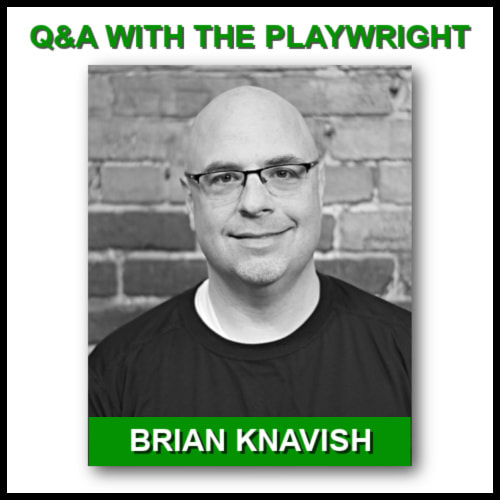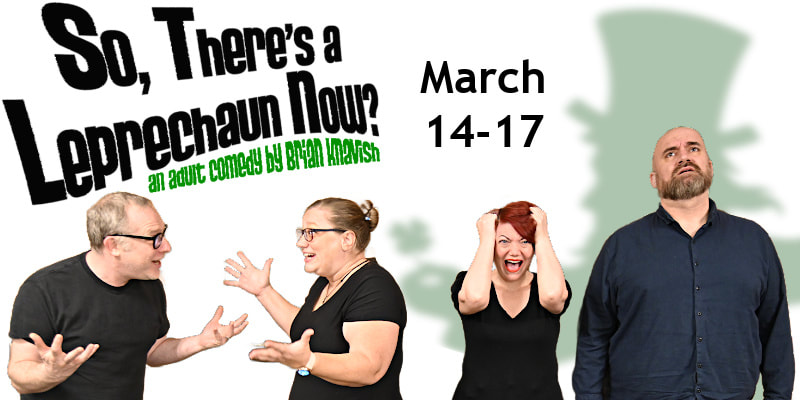|
Q&A with the Playwright For more than 30 years, R-ACT Theatre Productions has produced compelling theater “to keep the arts alive in Beaver County and beyond.” The plays have included classics written by household names, cutting edge new works by emerging local and national playwrights, and popular murder mysteries by R-ACT’s own Larry Spinnenweber. As part of our ongoing commitment to nurturing local talent, R-ACT is always thrilled to collaborate with playwrights from Beaver County and the Greater Pittsburgh Area. This dedication to supporting our local creative community is showcased in the kickoff of our 2024 season with the world premiere of 'So, There’s a Leprechaun Now?'—an adult comedy and the first full-length play by Pittsburgh’s Brian Knavish. R-ACT recently caught up with Brian to learn more. R-ACT: Tell us about your background and career. BK: My background is largely in writing. I was an English Writing major at Pitt, with a concentration in journalism. I wanted to be a sports writer when I grew up, and that’s what I did for a while. My first “real job” was as a sports writer right over the bridge at the Beaver County Times. I loved that job, but it was part-time, and that meant no benefits as a part-timer. From there, I landed a full-time job as the sports editor at a group of weekly newspapers in Pittsburgh’s east neighborhoods, and held that position for several years, covering high school and college sports. But then, after a while, as much as I love sports, I realized there are only so many ways to write “this team won” or “this team lost” so I branched out into human interest feature writing, which I really enjoyed. I was the editor of a Trib weekly called the “North Hills Weekender” where I wrote about bands, bars, community events and things like that. That was a great job, but then the publishers pulled the plug on it and I was assigned to hard news, which was not my thing. At that point I saw where the print newspaper business was headed, so I asked myself, “what else can I do with this journalism degree?” and the logical other side was media relations. So, instead of being the pesky reporter, I would deal with pesky reporters. I landed a job as the Marketing Director at the American Red Cross in Pittsburgh, and from there I took a similar position at Duquesne Light, then on to the Allegheny County Bar Association, where I’ve worked as the Director of Marketing, Media Relations, and Strategic Partnerships for the past nine years. R-ACT: It sounds like you have a lot of experience in journalism and marketing, but what about your theater-specific experience? BK: Well, when I was in high school – I went to Baldwin – I had no interest in theater. I didn’t do the musical or anything. I thought I was too cool for that … little did I realize that I was not cool by any measure, ha. I first took an interest in theater while at Pitt. As part of the English Writing program, we had to take 12 English Lit credits. At that time, I wanted to be a sports writer, period, so I looked at the English Lit as annoying requirements, so I picked the one I thought sounded the most “fun” and the least literature-ey, to create a word. I signed up for a “satire” course; it counted as a lit credit and assignments were things like watching Monty Python movies, so I thought it would be easy. The professor was Christopher Rawson, the long-time drama critic at the Pittsburgh Post-Gazette. It was a phenomenal class and he was an amazing professor. He also taught “Intro to Shakespeare” – which was not at all on my radar – but I needed another lit course, and I knew I liked the professor, so I signed up for that and was amazed that I actually enjoyed it. R-ACT: Those college courses sparked your interest in theater? BK: “Sparked” is a good word. It’s not like I took that Shakespeare class and decided I wanted to become a playwright. But it opened my mind to theater. As part of my English Writing degree, I had to take a lot of, well, writing classes of course. For me, those were mostly journalism classes, but fiction writing coursework was part of the program, too. So I wrote different little scenes and skits and things like that, and I was really drawn to the idea of moving an entire story arc using basically only dialog. R-ACT: Were there other factors, beyond your Pitt coursework, that led you to the theater? BK: Yes, there were a few things. For one, when I was working as a human interest features writer, I covered the various community theaters in Pittsburgh’s North Hills, like the Comtra Theatre in Cranberry and the now-defunct Red Barn Theater in Allison Park (not to be confused with the Red Barn Players of Ellwood City), which was such a cool theater by the way. I didn’t write reviews per se, but more preview stories of upcoming plays. I interviewed the directors and things like that. What that did was introduce me to the world of community theater. Around the same time, the Pittsburgh Public Theater produced the premiere of “The Chief,” a one-man show about Steelers founder Art Rooney. In my mind, yeah this was theater, but it was also sports … so it was “safe” if that makes sense. It was written by Rob Zellers and Gene Collier, a Post-Gazette sports columnist who I admired. In fact, it was Collier’s work that first made me want to be a sports writer. When I saw “The Chief” it totally changed my view of theater and what theater was and what theater “could be.” If theater could be about football, theater could be about anything, right? Anything, including things that interested me and things that were in my wheelhouse. R-ACT: So you’ve talked about what sparked your interest in theater, but what led to you taking steps toward writing theater of your own? BK: Well, seeing “The Chief” made me really like the Pittsburgh Public Theater, so I started checking out more of the plays at the Public. In fact, my first date with my now wife, Stacey, was to see “The Importance of Being Earnest” at the Public in 2006. We would go to the Public a good bit, once or twice per season, and as a result we were on the Public’s mailing list. So one day we got a mailer for a preview of the upcoming season … I believe it was the 2010-2011 season. They were offering free wine and appetizers and a discussion with Ted Pappas, the Public’s artistic director at the time. “We see what they’re trying to do” my wife and I said to each other, as if we were all smart. “They want us to come, drink wine and buy a season subscription.” Don’t get me wrong, we were going to go the event, see what was coming up, enjoy the free food and wine, maybe buy tickets to a play or two, but we were NOT falling for their tactics and buying a season subscription. Like I said, we were too smart for that. Well we went, got drunk, and bought a season subscription, ha. It was a blessing in disguise because we saw every production that season and we had a blast. But, in going to the Public so much, I saw an ad in the program for playwriting classes offered at the Public. R-ACT: So you took playwriting classes at the Public? BK: Yes, several different sessions over a few years, and I loved it. It was so cool being around so many other creative types. The first class I took was taught by Chris Dimond, and he really helped me to understand the genre, the structure of a play, what the “major dramatic question” means and things like that. Then, subsequent sessions were taught by Tammy Ryan, a very accomplished playwright who your readers might be familiar with. Tammy is awesome. She’s a tremendous playwright, but also just a kind, welcoming and funny person, and a great teacher. Working with her took my interest in playwriting to a different level. And then life happened . . . R-ACT: What do you mean by that? BK: I had kids! Obviously having my daughters – Samantha, who is now 11 and Maria, who is 7 – is the best thing to ever happen to me. But, as anyone who has ever had kids knows, free time pretty much goes away. I was working full-time and had two small kids. That took up most of my time. Playwriting became a “someday” thing. Someday, when I had more time, I would write a play. Like write and finish one. I had started different plays, dabbled, screwed around with scenes and things like that, but some day I would write and complete an entire play. It was a bucket list thing for me. R-ACT: What turned “someday” into “today”? BK: In a word: COVID. Obviously there wasn’t much else going on in the world, so I had some time. I said to myself, “Brian, if ever there were a time to do this, it’s now.” R-ACT: So during Covid, did you just start writing this play? BK: In a way, yes. Even amid the pandemic, I only had so much time given I still had two small kids and still had a full-time job, other hobbies and things like that. But I did get to writing. And I had remained Facebook friends with Tammy Ryan, and I saw that she was conducting playwriting workshops on Zoom. So I signed up and re-connected with her, as well as a small group of other playwrights. It was very cool. Beyond her workshops, you can also hire Tammy to review your entire play one-on-one. I did that a couple of times during various stages of my writing. R-ACT: You’ve mentioned Tammy Ryan a few times. How instrumental was she in getting “Leprechaun” produced? BK: She was – and continues to be – extremely instrumental in the playwriting part of my life. As I explained earlier, my background is in writing, but my background is not in theater. Tammy really helped to bridge that gap for me. She has such a good way of reviewing a scene – or an entire play – and offering feedback, criticism but in a constructive way. And, more than anything, she has a tremendous ability to review your work and offer feedback, but not try to make your play, her play, if that makes sense. When reading a play, a lot of people – me included – like to sort of tell the writer what the characters “should” do or say. That’s different than critiquing play. That’s a nuanced difference, but a very significant one, and that’s what set Tammy’s feedback apart, at least for me. R-ACT: So tell us about “Leprechaun” itself. How did you come up with this particular play? BK: I mentioned how writing a play was always a “bucket list” thing for me. Well through the years – literally a decade – I kept a note in my phone of “play ideas.” I would put broad ideas for plays in there, specific jokes, scene ideas, character names, you name it. I just had this list, but it wasn’t for Leprechaun in particular. Another factor in Leprechaun itself is that once I became a parent, like any parent, your kids become the biggest and most important thing in your life. They’re also funny as hell and, of course, they can bring out all of the emotions. They’re great source material for a play. So real life unfolded, and my girls unknowingly gave me a ton of ideas. R-ACT: What specific ideas came from your kids for this particular play? BK: Well, holidays are special to me. My parents made the holidays so special and memorable, and those are some of my most cherished childhood memories. My wife, Stacey, also cherishes her holiday memories, so when we had kids, we wanted to do everything we could to make the holidays special for our little ones. We tried to pay attention to every little detail about Santa and be consistent with our stories to keep that magic alive as long as possible. But what we didn’t think of is that OTHER parents may have slightly – or not so slightly – different narratives surrounding Santa. Like “Santa wraps presents at our house, but doesn’t wrap them at Jimmy’s house. Why is that?” The “Elf on a Shelf” thing took this to an entirely different level because every family seems to do it differently. So when these things come up with both the kids and the parents present, it’s hysterical watching the parents stammer and stumble trying to not contradict each other and come up with these ridiculous scenarios or excuses or reasoning. They’re trying to protect version A of the story and acknowledge version B of the story in a way that doesn’t seem fake. The parents are trying to keep a straight face and basically not break character, all for the sake of trying to protect that holiday magic. When my older daughter, Sam, was in those early elementary school years, I saw this a lot and really thought it was funny. I tried to capture that dynamic – the bumbling, stumbling parents struggling to weave together already-ridiculous narratives while keeping a straight face – and build a play around it. R-ACT: And what made you pick St. Patrick’s Day? BK: Just randomly one day, after Christmas and the Elf on a Shelf went away but with St. Patrick’s Day on the horizon, the idea just came to me. Could I put this “stumbling, bumbling parents protecting the magic” dynamic on top of a framework involving a leprechaun that’s a lot like Elf on a Shelf? I fell in love with this idea, started screwing around with different characters and scenes and stuff like that. R-ACT: Are any of the characters you? BK: I get that question a lot. None of the characters are me, but all of them are me, if that makes sense. My kids’ childhoods and the interaction with other loving parents inspired the dynamic, but none of the characters are specifically based on real people. R-ACT: Once the script was complete, how did you go about finding a theater to produce it? BK: That was quite a learning experience for me, in a good way. Once I completed the script, had table readings and things like that and got to a point where I was happy with it, I basically said “now what?” Like I keep mentioning, my background is in writing, not theater, so I had no idea how that process worked. Tammy was invaluable in pointing me in the right direction, and one of the best pieces of advice she gave me was to join the Dramatists Guild. That’s the trade association for playwrights, and the Dramatists Guild has resources to help playwrights find theaters that are a good fit. They provide sample licensing agreements, all of those things related to the “business” end of theater. That gave me some direction. R-ACT: Can you speak to how you connected with R-ACT in particular? BK: While I was shopping this script around, I sent it to a ton of theaters. Each one has a different process. Some want you to send the entire script. Some want you to send only 10 pages. Some have a specific time period when they will accept scripts, and some will only accept scripts from agents, things like that. It’s hard to get a theater interested, but, as I’ve learned, it’s especially hard for a complete unknown like me to get a script noticed. While I was shopping this around, sending scripts out all over the place, I happened to post the synopsis on a Pittsburgh-area theater Facebook group. Someone on there connected me with Jenn Rian, an actress who is also on the R-ACT executive board. She asked me to send the script, so I did, and she liked it. She and I stayed in contact for basically a year until it was finalized. In the meantime, I got to know R-ACT more. I’m almost ashamed to admit I had never heard of R-ACT prior to this, but now I love it. Stacey and I checked out a couple shows at R-ACT over the past year. It’s such a cool theater, a cool space. And the fact that R-ACT explores out-of-the-box works – not just the classics, and not just the cliches – that REALLY appeals to me. I owe Jenn and R-ACT the world for taking a chance on this and on me. R-ACT: How has working with director Barbara Burgess-Lefebvre been for you? BK: Awesome. Truly and completely awesome. As I keep saying, my background is in writing, not theater. And a big hurdle in getting this produced was connecting with a director willing to direct it. I don’t have a deep rolodex of theater personnel, so I did not know Barbara. R-ACT had a “meet the director” type event one night last fall, and that’s where I met Barbara. I explained to her the background, my vision and gave her the script. She messaged me a day later saying she wanted to direct it. I had hoped to connect with an experienced director, but connecting with someone at Barbara’s level – someone who has been directing for 30 years – is not something I could have ever expected, as a brand new, unknown playwright. Theater is not a hobby for her, it’s her career. I’ve enjoyed just sitting back and watching her select a dynamite cast, make the necessary tweaks and really bring this thing to life. Keep in mind, this is my first experience with the production aspect of a play. It's been fascinating watching her work and coach the cast and really visualize what this will look like on stage. She’s a pro. R-ACT: What are your thoughts on the cast? BK: I’m extremely excited about this cast. That’s one thing I was nervous about. These characters have existed only in my head, and now, I’m trusting a group of complete strangers to bring them to life … and they’re nailing it. Having a youngster in Johnna Lefebvre portray Hailey is great. She captures the youthfulness of a kindergartner perfectly, and she looks the part. Jenn Rian is almost identical to the version of Liz in my head. She’s so very funny, and so committed to that character. When I see her do Liz, I actually see the Liz that existed in my mind. Jess is probably the most complex character in the play in my opinion, because she’s like the main mom, and she changes the most during the play. Sarah Orbin is great because she’s really able to capture the way that character evolves throughout the script. The character of Tanya doesn’t have as big of a role as the other adults, but she’s not a minor character in my mind. She’s very different than the others – in terms of age, location you name it – which shakes things up. Colleen Tracy has brought positive enhancements to Tanya that I never even though of. Michael Phelps plays the character of Mike, appropriately enough. He’s a very analytical attorney who puts those skills to use in his parenting in an absurd way, but the character Mike isn’t aware of the absurdity. The actor Mike captures that perfectly. And last but not least is Ted Froats, who is Jack, a ranting, raving newly single dad. Without giving too much away, Jack is basically three characters and Ted portrays each of them in a brilliantly hysterical way. R-ACT: Once we announced “Leprechaun,” the response was substantial, with all performances quickly selling out. Did you expect this kind of response? BK: I didn’t know what to expect. One thing I haven’t mentioned so far is that this part of my life, playwriting, is something I’ve kept extremely private. Very few people knew I dabbled in this, so I when I announced this on Facebook, I didn’t know what to expect. But the response from friends and family was all excitement, support and enthusiasm. A lot of friends and family bought tickets, but it’s not like every ticket sold is someone I know. I think a lot of people who know the cast and how talented they all are bought tickets. And, I work in marketing, so I know that one of the best things you can do when marketing a product, service or event is to create demand. I think that once word got around that tickets were going quickly, they went even more quickly if that makes sense. R-ACT: During the period when we were negotiating a licensing agreement, it was evident that it’s quite important to you that this be marketed as an “adult comedy.” Can you speak to that? BK: Yes, it’s about kids, but it’s not for kids. It’s extremely important to me that everyone knows this is an adult comedy about parenting. There’s adult language, marijuana and alcohol use, and while it’s a comedy, there are some adult themes. One of my artistic goals with this production is to illustrate how important it is to protect holiday magic for children. This play would absolutely ruin Santa almost instantly for any child. I sure as hell don’t want that on my conscious. So many people hear the word “Leprechaun” an assume it’s children’s theater, and it’s not. Like not at all. R-ACT: Any final thoughts? BK: Yes, I hope that – if there are tickets available when you’re reading this – that you’ll give it a chance. I think it’s relatable and that you’ll laugh. Another thing I want folks to know is that R-ACT is a special place. My play is just a six-show run, but R-ACT has been around for over 30 years. They are committed to keeping the arts alive in Beaver County, and for that to happen, R-ACT needs your support. I hope that you’ll not only come out to “Leprechaun” but also to check out the various other R-ACT productions this year and beyond. R-ACT's 2024 season offers a variety of entertaining stage productions. Alongside the original adult comedy, “So, There's a Leprechaun Now?" by Brian Knavish, directed by Barbara Burgess-Lefebvre, the upcoming season features the audience participation murder mystery, "Murder on the Mesa," written and directed by Larry Spinnenweber (May 10-18). Following that, Lauren Gunderson's "The Revolutionists" will take the stage under the direction of Brooke Echnat (October 11-19), while Tim Piper directs "Alice in Wonderland," serving as R-ACT's annual charity holiday radio show December 5-8.
"So, There's a Leprechaun Now?" by Brian Knavish runs March 14-17, 2024, at the Segriff Stage in Rochester, PA. This world premiere play boasts a stellar cast, including Sarah Leigh Orbin (Arnold), Michael Phelps (Center Township), Jenn Rian (Beaver Falls), Ted Froats (Pittsburgh), Johnna Lefebvre (Ambridge), and Colleen Tracy (Bellevue). Philip Collin (Pittsburgh) and Jeremy Ernstoff (Pittsburgh) serve as understudies. Limited tickets are exclusively available online, with no walk-ins accepted and no tickets sold at the door.
0 Comments
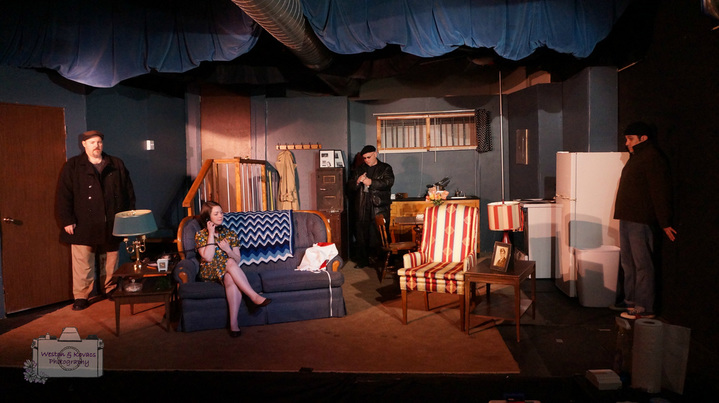 The upcoming show, Wait Until Dark, is a bit of a departure from the more light hearted productions our patrons have seen recently. Director Mike Nelson has turned to a darker, more suspense-laden show this time around at the Avenue Theater. When first presented with the script, he had second thoughts on it, but, “after working with such a talented group of actors and tech folks, it is very much becoming one of my favorite shows,” according to Nelson. Actors Jess Kowach, (Susie) and Dave Joseph, (Roat), agree that the first scene is their favorite in the show. Jess says the scene captures the audience and draws them in immediately, and Dave adds you see the three main antagonists constantly sizing each other up to see where they stand. Kowach and Joseph also commented on some of the steps they took in preparing for their roles. Jess practiced walking around in the dark and with her eyes closed to get into character. Not an easy task and she “has the bruises to prove it, “said Kowach. For Joseph, music played a crucial role. “One of the ways I got into character was by listening to dark, powerful music. Certain excerpts from Dvorak’s New World Symphony can take me to a really dark place,” he said. For Cassidy Soto, (Gloria), getting into character required her to work both on being both louder and more childish than she is. “This prep was difficult, because it is very out of my comfort zone, “ Cassidy stated. Eric McAnallen didn’t have any specific tricks for getting into his character, (Mike). According to McAnallen, “I’ve been trying to play Mike as real as possible, which means his actions and speech are not that far from my own.” McAnallen says, “In a different time and place, I could be Mike. We both have that potential to do wrong and we both have too much of a conscience to let that wrong be something that gets someone hurt.” 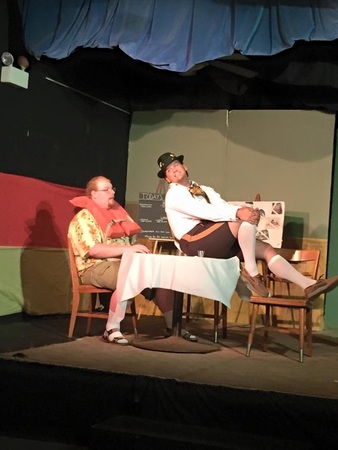 Director Suzanne Weber has assembled an excellent cast to populate the maiden voyage of the S.S. Wunderbar, a magnificent cruise ship of German registry. The Love Boat had nothing on the Wunderbar. You’ll be treated to a couple embarking to enjoy their honeymoon, although one of them is terrified of the sea; a comic book artist putting the finishing touches on the newest superhero in a pantheon of heroes. A greeting card writer who can’t stop plying her craft even on her vacation cruise, along with a beautiful starlet, hoping to completely recover from a devastating accident that wreaked havoc on her career. The crew includes a purser named Gunther with exquisite taste in apparel, a Teutonic former nanny is the cruise director, while a celebrated New York Photographer is on hand to capture memories. Who can imagine a more idyllic scene? But murder awaits. Whodunit? Watch carefully and perhaps you will be able to identify the culprit. Character lines in a vacuum sometimes make you scratch your head. But put them in context, and you’ll be laughing out loud. Join us and enjoy these and other lines straight from the character’s themselves. Don’t Say it! You said it! She fell off an Alp? It hasn’t been 2 years. It’s been 1 year, 11 months and 25 days. You used my nerdy sap of a husband? I SAID YOU NEED SOME SNAPPS! I don’t think you do anything normally. 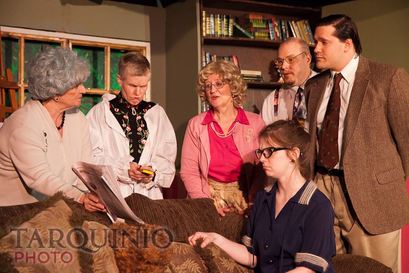 When looking back at a show you're part of, it’s hard not to have favorites – rehearsal moments, lines, characters, etc. The actors of The Curious Savage are here to share some of those with you as they prepare to open the show tonight. Cheryl Crabb and many of the other cast members love the scene where all the sanatorium’s residents spill on stage when a door opens getting caught snooping. Veronica White likes the gentle tenderness between the characters Jeff and Miss Willie at the end of the show, especially when she kisses him then apologizes for being so tired and forgetting. Veronica says, "that scene is very quiet but very powerful." Jess Kowach remembers laughing at the ad-libbing during rehearsal when Hannibal throws his cards up in the air and then picks them up one by one, bending over right in front of Lily Belle. Lily Belle said "Do something about this man's ass in my face!" Needless to say, Jess wasn’t the only one cracking up. And, it’s not just the scenes that make a lasting impression – whether sad, happy, or funny. The actors also have their favorite lines of the show like: "Please speak some witch talk for us!" “50 needles and 50 pins and 50 dirty Republicans.” “Something hyphenated.” "Do you light up when you're mating, Lily Belle?" "...you're a perfect witch!" "She bit me!" It’s moments and lines like this that motivate actors to give it their all. Join us for these and many other ‘favorite’ scenes. See what part of the show you love the most and let us know! 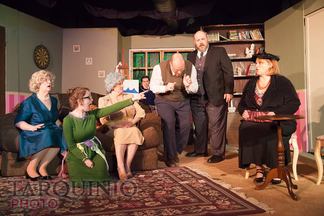 Yelling, biting, tears, laughter, jealousy, hatred, love and so much more! That’s just a little bit of what happens in R-ACT Theatre Productions’ The Curious Savage showing this weekend only. The actors have thoroughly embraced their alter egos in this show – most being nothing like their character in real life. Some of the actors have described themselves as a self-absorbed princess, an overbearing stepson, and an overly dramatic girl needing love. Along with the other over-the-top characters, they all get a reality check by a kindly widow just wanting to spread some happiness and do some good. After spending weeks living with their characters, the actors have had lots of practice ‘getting into character.’ Cheryl Crabb had to practice being less feisty since her character is a meek, motherly figure. She does admit, though, that, like a younger Mrs. Savage, she had a "great seat"! Eric McAnallen, however, got into his character by “berating the servers at the restaurant where he had dinner, and then he would slap around a box of kittens while lighting a cigar with a $100 bill.” All in his mind of course. Clearly acting takes a lot of work getting into character. All in all – the actors have had their work cut out for them during this production. Come see if it’s all paid off. They want your love and also hate for these wacky people at the sanatorium. Or, as Mark LaMarche describes it – the madhouse. 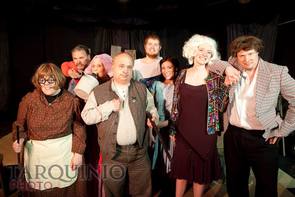 What do you think of yourself? Ever ask yourself that question? Actors do it all the time because you can’t ‘become’ someone else without changing your attitude, thoughts, actions, and beliefs. How can you play stupid if you’re smart? Act mean if you’re sweet and compassionate? How long can you last speaking with a new accent? What about impersonating another character while being in character yourself? Sound confusing? You’ll see these performers take it all on and kill it…well kill someone at least. Valerie Boyce (Rosa Lee Hayford) shares that she and Rosa Lee share a love for animals and kind-heartedness. Oh, and they also can both shoot a gun. Could her sweet and innocent act be fake? Bridget Yeager (Vlouptua Amore) loves playing the bad girl of the show because she’s not in everyday life. The character is boy crazy and self-centered so unlike Bridget, but they do both love to act. Could this bad girl have turned really bad – bad enough to kill? Diane Brosius (Beulah McKade) only got into her mean-to-the-bone character after repeated nagging from Director, Cheryl Crabb. Could this murder be done just because someone’s mean enough to kill? Finally, there’s Clay Glenny (Reuben McKade) who’s smarter than his character acts. He’s sweet and good natured, but could he just be dumb enough (I mean smart enough) to commit murder? I guess you’ll just have to wait and see which of the Hollar resident’s hidden personality and desires created a murderer.  Welcome to the Hollar! R-ACT Theatre Productions is back with another audience participation murder mystery. Cheryl Crabb thoroughly enjoyed directing this production and is thankful for such a participative cast that was willing to change their blocking many, many times. She also bribed them during rehearsals with food to keep everyone happy too. When asked for some insider information on the show, Cheryl shared of the many laughs the whole group had during rehearsals. It also seems that there’s a lot of contradictions between actors’ personalities compared to their show characters. Quiet Bridget Yeager as Voluptua Amore is vamped up like never before while sweet and positive Diane Brosius plays the meanest of them all – Beulah McKade. There’s also sleazy Seymour Simpson played by Eric Armstrong. Other characters Cheryl describes are sweet Rosa Lee, laughable Reuben McKade, and dim-witted Zeke. Then there’s Luther Drummer – the Benedict Cumberbatch of the hollar. All in all, it’s one motley group of misfits and someone’s gonna git it. Get your tickets today so you can find out who – and WHY! 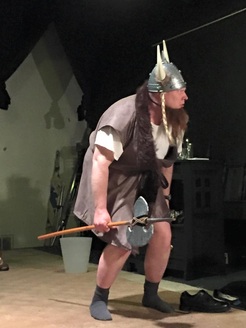 Everybody has favorites – foods, books…people. Actors have favorites with their shows too. Sometimes the favorite is their own part, line, or scene while other times, fellow characters steal the show for everyone. Let’s find out some favorite things the ‘Do Not Disturb’ actors have before opening night. The wigs of the show are rated at the top of this show’s list. Seeing everyone transform from one character to another was amazing and hilarious. The costume room is packed with all the changes. Co-Director, Debbie Bowser, says she enjoyed watching everyone transform from one person to another since there are 8 actors for 22 parts. The laughter never stopped during rehearsal with the switches. Conrad Bianco remembers the hilarity of performing the rendezvous scene the first time. No details provided so you’ll have to watch to see why. The character that left the biggest impression on Mark LaMarche was ‘Melissa’ because of how limber she was. Eric Armstrong remembers many fond memories of rehearsals, but his funniest experience was the considerable number of rehearsals the cast went through to try to get his character’s pants to come off quickly. He shared that he ‘was feeling the breeze.’ More favorite parts are the lines of the show. Here are some of the funniest (at least for the cast). You’ll just have to see the show to figure out what they mean…and if they really are funny. “What’s the matter with him?” “Now, I’d love to stay here and do unnatural things with mules on film for you, but…I’ve got a job!” "You wanna kiss Carl?" “Do you want to go bowling?” “E-D-R....eater...eat her." And, let’s just say…that’s only the beginning. Don’t miss the hilarious comedy showing this weekend at The Avenue Theater. 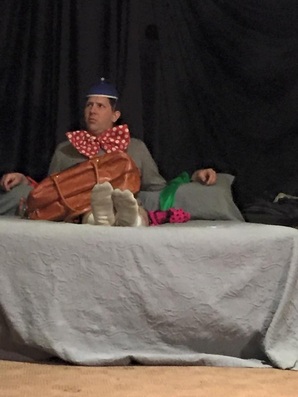 Character analysis – Who are you? What are you? Where are you…from? Well, the cast had these and many more things to think about while developing their characters. Now they’re sharing their ‘research’ with you by comparing themselves to their show personalities. Conrad Bianco says his character Craig “is portrayed as a high stacks tycoon who would cheat and lie just to make an extra buck. Me, I'm happy being true to myself and good to others.” Amy Ellefson feels she’s like some similar in attitude to some of her characters as all their personalities are light-hearted, fun and adventurous. You’ll just have to see the other personalities (I mean characters) come out during the show. Devious is how Vicki Mann describes her character while she herself is not. She does enjoy ‘hamming it up’ on stage, though, and pushing herself out of her natural tendencies. Do you think it would be easier to ‘play’ a similar or different personality? How about multiple personalities in a matter of two hours? As I was writing this blog it became difficult keeping all the actors and characters straight, and I was only writing about them. Come let us amaze you with these crazy characters this weekend, and we’ll see if you can keep them all straight. 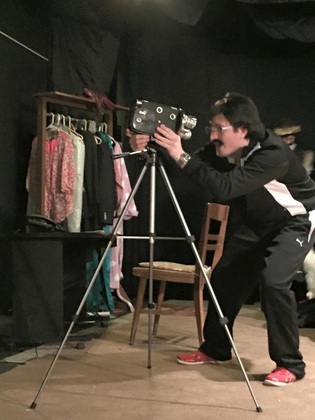 What do you get when you have a one-room set for 6 shows with 2 directors, 8 actors, 22 characters, numerous wigs, countless costumes, and a full group of amazing backstage crew? Of course, it’s one uproariously funny and entertaining production by the talented R-ACT members, which is just in time for Valentine’s weekend. Directors, Debbie Bowser and Larry Spinnenweber, have been having a wonderful time during rehearsals, laughing at and with the cast and crew. Many of which are new or newer to acting and production work. That’s one of the best parts of the R-ACT organization in my opinion-no experience necessary to participate. Enjoy theater? Ever wondered if you can be part of show business? You CAN. But back to this show…since the cast plays multiple roles, the challenge for this production was creating unique character personalities and appearances. To do this, Debbie had the actors analyze their characters, creating a ‘life’ for each one. She describes the actors/characters as a riot, delightful, amazing, and…flexible (literally). This cast was game for anything and takes these risqué one acts to the edge all while creating a crazy and funny experience. Debbie says, “If you have as much fun as we did making this show, you’re in for a treat.” So come join us and enjoy. |
AuthorR-ACT Members Archives
March 2024
|
Location |
Office Phone
724-775-6844
Call us and leave a message. We will return your call as soon as we can! |
Connect with Us
|

